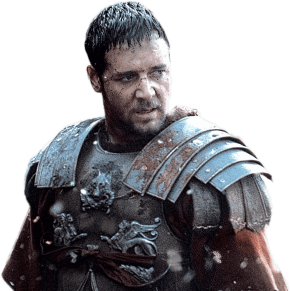Maximus Decimus Meridius
| Maximus Decimus Meridius | ||||||
|---|---|---|---|---|---|---|
| ||||||
| Vital statistics | ||||||
| Names | Maximus Decimus Meridius, the Spaniard, Gladiator, Aelius Maximus, Maximus the Merciful, the Savior of Rome, Maximus the Invincible | |||||
| Gender | Male | |||||
| Race | Human | |||||
| Occupation | Gladiator
Commander, Armies of the North and Felix Legions | |||||
| Origin | Gladiator (May 1, 2000) | |||||
| Alignment | Good | |||||
| Age | 40s | |||||
| Created By | David Franzoni, John Logan, William Nicholson, Ridley Scott | |||||
| Height | 182 cm (6ft 0in) | |||||
| Weight | 92 kg (203 lbs) | |||||
Maximus Decimus Meridius was a celebrated Roman general, serving as commander of the Armies of the North and the Felix Legions. Regarded as Rome’s greatest general of the 2nd century AD, he loyally fought under Emperor Marcus Aurelius during the Twelve-Year Campaign against the Germanic tribes near Vindobona in Germania. Marcus Aurelius intended for Maximus to succeed him and restore the Roman Republic. However, Marcus’s son, Commodus, sought to seize power and ordered the Praetorian Guard to execute Maximus and his family when Maximus refused to swear loyalty. Though Maximus escaped, he was captured, enslaved, and became a renowned gladiator. In 192 AD, he avenged the deaths of his emperor, wife, and son by killing Commodus in combat, though he succumbed to his own wounds shortly thereafter. Maximus was portrayed by Russell Crowe in the 2000 film Gladiator.
In Gladiator II, archive footage of Russell Crowe as Maximus is used to underscore the character’s enduring legacy. Maximus is idolized by Lucius Verus, who recalls his heroic deeds while fighting to liberate Rome from oppressive forces. One of these forces, General Marcus Acacius, was a former protégé of Maximus. Though Acacius participates in conquests under Emperors Geta and Caracalla, he also harbors a desire to fulfill Maximus’s vision of a restored republic.
Appearance[edit | edit source]
Maximus Decimus Meridius is portrayed as a rugged, physically imposing man in his prime, with a strong and muscular build befitting a Roman general and gladiator. He has short, dark hair and a well-trimmed beard, reflecting the practical grooming of a soldier. His piercing eyes convey both his inner strength and the grief that fuels his journey. Throughout the film, he is seen in a variety of attire, from the commanding armor of a general to the bare essentials of a slave and the iconic gladiatorial gear, which includes his steel helmet and tunic. The scars on his body serve as a testament to his years on the battlefield and in the arena.
Personality[edit | edit source]
Maximus is characterized by his unwavering sense of honor, loyalty, and moral integrity. A man of few words, his actions speak louder than his speech, revealing a deep sense of duty to his family, comrades, and Rome itself. Despite the hardships he endures, including betrayal, the murder of his family, and enslavement, he remains steadfast in his values, driven by love for his wife and son and a desire to restore justice.
He is fiercely determined and courageous, demonstrating remarkable leadership and strategic brilliance on the battlefield and in the arena. Yet, Maximus is not without vulnerability; he carries immense grief and trauma, which he channels into his quest for vengeance and redemption. His humility and respect for others, from soldiers to fellow gladiators, earn him loyalty and admiration, while his quiet defiance in the face of corruption makes him a symbol of resistance against tyranny.
Biography[edit | edit source]
Background[edit | edit source]
Maximus Decimus Meridius was born in Hispania, though the film does not specify his exact birthdate. He lived on a farm with his wife and son, where the scent of herbs lingered in the air during the day. As a devoted family man, his farm was his sanctuary from the chaos of war. Maximus was esteemed by Emperor Marcus Aurelius for his honor, integrity, and incorruptible character. However, his life was shattered when Commodus, envious of his father's favor toward Maximus, ordered the murder of his wife and son and the destruction of his village.
Life as a General[edit | edit source]
Maximus served as a Roman general, leading legions under Emperor Marcus Aurelius during campaigns in Germania. Renowned for his leadership and courage, he inspired his troops with a stirring speech before a decisive battle, declaring, “What we do in life echoes in eternity!” Despite suffering heavy losses, his forces achieved victory over the Germanic tribes.
Following the battle, Maximus was honored by Marcus Aurelius for his unwavering loyalty and military prowess. However, this admiration earned him the resentment of Commodus, the emperor's son. As Marcus neared death, he confided in Maximus his concerns about Rome's future. He lamented that his reign had brought endless war and believed the Caesars had silenced the voice of the people. Trusting Maximus to restore Rome to its former glory, Marcus offered him the title of Caesar, bypassing Commodus, whom he deemed unfit to rule.
This decision enraged Commodus, who secretly murdered his father and seized the throne. Betrayed by his trusted subordinate Quintus, Maximus was sentenced to death. In the woods, he overpowered and killed his executioners, escaping with his life. When he returned to his farm, he was met with a harrowing sight—his wife and son had been crucified, and his home destroyed on Commodus's orders. Overcome with grief, Maximus buried his family before collapsing from exhaustion beside their graves.
Life as a Gladiator[edit | edit source]
After his collapse near his family’s grave, Maximus was captured by a band of roaming thieves while he slept. Among the captives was Juba, a Numidian soldier posing as a hunter, who was also taken to be sold into slavery. Together, they endured a grueling desert crossing before arriving at a slave market, where Maximus was purchased by Proximo, an aging former gladiator who now owned a gladiator school.
Initially, Maximus resisted captivity, refusing to train and even burning away the legion's brand on his shoulder. Under the name "Spaniard," he began competing in gladiatorial games, demonstrating extraordinary strength and tactical skill in the arena. His victories earned him a growing reputation, and eventually, Proximo offered him the opportunity to fight in Rome's Colosseum, the pinnacle of gladiatorial combat.
In Rome, Maximus fought alongside Juba, Hagen, and other gladiators, portraying "Barbarians of Carthage" in a reenactment of a famous battle. Following Maximus’s leadership, the group triumphed, defying the expected narrative. Commodus, intrigued by the "Spaniard," descended to the arena to learn his identity. Maximus removed his helmet, revealing himself to the shocked emperor, who had presumed him dead. Fearing the crowd’s support for Maximus, Commodus allowed him and the other gladiators to live.
Soon after, Lucilla, Commodus's sister, secretly approached Maximus. She urged him to meet with Senator Gracchus to plan Commodus's overthrow, but Maximus, consumed by his losses and despair, refused, stating he was no longer the man she once knew.
Determined to eliminate Maximus, Commodus arranged for him to face Tigris of Gaul, a formidable gladiator, in a deadly arena battle enhanced by unleashed tigers. Despite the danger, Maximus emerged victorious but chose to spare Tigris’s life, earning the moniker "Maximus the Merciful" and further infuriating Commodus.
After the match, Maximus was met by his faithful servant Cicero, who brought him his prayer figurines. Reinvigorated, Maximus instructed Cicero to inform Lucilla that he would meet with Senator Gracchus, signaling his readiness to fight for Rome’s liberation.
Maximus then attempted to stage a coup to overthrow Commodus and escape to freedom. However, Commodus discovered his plan. Unwilling to make Maximus a martyr, Commodus publicly challenged him to a duel in the Colosseum but ensured the odds were in his favor by secretly stabbing Maximus in the side beforehand. Despite the injury, Maximus managed to disarm Commodus during the fight. When the emperor’s guards refused to provide him with a weapon, the battle devolved into hand-to-hand combat. Commodus ultimately drew a concealed dagger, but Maximus turned it against him, killing the tyrant. In his final moments, Maximus avenged his family and emperor, but he succumbed to his wound shortly after.
Before dying, Maximus called for Senator Gracchus to be reinstated and for the Roman Republic to be restored, ensuring Commodus’s corrupt rule ended with his death. Lucilla honored him as a soldier of Rome, and Juba, his friend and fellow gladiator, declared their freedom. As a final tribute, Juba buried Maximus's figurines of his wife and son where he had died.
Legacy[edit | edit source]
Sixteen years after Maximus’s death, his vision of freedom for Rome remains unfulfilled. The empire is now ruled by the twin emperors Caracalla and Geta, and the Senate remains corrupt. Rome continues its relentless expansion through conquest, while many of its people suffer from poverty and starvation.
To protect her son Lucius Verus—secretly Maximus’s child—Lucilla sent him to Numidia. However, he was captured when her husband, General Marcus Acacius, led an invasion of the region. Known by the alias "Hanno," Lucius was taken back to Rome and forced into gladiatorial servitude.
When Lucilla recognized her son in the arena, she approached him to apologize for abandoning him as a child. Lucius, embittered by the loss of his wife, Arishat, and the devastation of Numidia, rejected her, shouting for her to leave. Even as she revealed that Maximus was his father, Lucius refused to forgive her.
While in captivity, Lucius befriended the doctor Ravi, who revealed his admiration for Maximus and showed him a shrine dedicated to the legendary gladiator. The shrine contained Maximus's armor and sword, reminding Lucius of the enduring legacy of his father and the freedom he fought to achieve.
Powers and Statistics[edit | edit source]
Tier: 9-C, higher with weapons
Powers and Abilities: Peak Human Strength, Expert hand-to-hand combatant (Defeated Tigris of Gaul, the only undefeated champion in Roman history), Weapon Mastery, Stealth Mastery
Attack Potency: Street level (Killed 5 Gladiators in a row. Fought off a tiger with his shield, then killed another with his sword[1]. Fought on par with Tigris of Gaul[1]. Even while badly injured he was capable of fighting Commodus[1]), higher with weapons
Speed: Peak Human combat speed, Superhuman reactions
Lifting Strength: Above Average Human
Striking Strength: Street level
Durability: Street level physically, higher with shields
Stamina: Superhuman (Can run and fight for long periods)
Range: Standard Melee Range physically, Extended Melee Range with weapons
Standard Equipment: Swords, shield, helmet
Intelligence: Gifted (Maximus came up with brilliant strategies several times; is an expert on ambushes, planning, and expert survival skills. Marcus Aurelius proclaimed him to be Rome's greatest general, uncorrupted by politics. He instantly knew that Aurelius did not die of natural causes.)
Weaknesses: He is said to be a bad liar
Trivia[edit | edit source]
- Although Maximus does not appear in Gladiator II due to his death in the original film, director Ridley Scott emphasized that the sequel's identity is deeply influenced by his legacy. To maintain a connection to Maximus, the storyline incorporates characters linked to him: Marcus Acacius, a general who trained under Maximus, and Lucius Verus, who cherishes memories of Maximus from childhood.
- Ridley Scott explored several ideas for resurrecting Maximus for a sequel. One early concept involved a dying warrior serving as a portal to bring Maximus back to life. However, Scott abandoned the idea, remarking, “That didn’t go down too well with the nobs. They thought it was ridiculous.”
- Another, more radical concept was written by musician and screenwriter Nick Cave around 2006. In this version, Maximus was in purgatory, where he discovered that the gods were dying from a lack of worship. They tasked Maximus with returning to Earth to kill Jesus Christ and his followers. The idea was rejected by the studio and reportedly disliked by Russell Crowe, effectively shelving the project.
Theme[edit | edit source]
References[edit | edit source]

